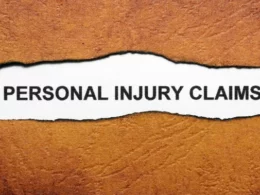When you are pursuing a personal injury claim, you may be asked to undergo a medical examination. This can be a daunting prospect, especially if you’re not sure what to expect.
It is normal to be worried about the process, concerned about the results, or unsure of what your rights are during the examination. However, understanding what to expect and how to prepare can help you feel more confident and in control.
Therefore, in this article, we’ll walk you through the personal injury claim medical examination process from start to finish. We’ll cover what you can expect during the examination, including the types of tests that may be performed and the questions you may be asked. We’ll also discuss how to prepare for the examination, including what to bring with you and how to communicate effectively with the examiner.
Additionally, we’ll address some of the common challenges and worries you may have about the examination. For example, you may be concerned about the accuracy of the examination or worried that the results will be used against you in court. We’ll address these concerns and provide tips for navigating the examination process with confidence.
By the end of this article, you’ll have a clear understanding of what to expect during a personal injury claim medical examination and how to prepare for it. You’ll be empowered to approach the examination with confidence and to advocate for your rights throughout the process.
What is a Personal Injury Claim?
If you have been injured due to someone else’s negligence, you may have a personal injury claim. A personal injury claim is a legal dispute that arises when one person is injured due to the negligence of another person or entity. In a personal injury claim, the injured party (plaintiff) seeks compensation for their injuries, such as medical expenses, lost wages, and pain and suffering.
The Role of Medical Examination in Personal Injury Claims
Medical examinations play a crucial role in personal injury claims. When you file a personal injury claim, the insurance company or the defendant’s attorney will likely request a medical examination to evaluate your injuries. The purpose of this examination is to determine the extent of your injuries, the prognosis for recovery, and the appropriate medical treatment.
The medical examination is typically conducted by a healthcare provider chosen by the insurance company or the defendant’s attorney. This healthcare provider is supposed to be an unbiased medical expert who will evaluate your injuries and provide an opinion on your prognosis and treatment plan.
Nonetheless, it’s vital to note that this healthcare provider is not your treating doctor and is not there to provide medical treatment or advice.
The medical examination report is an important piece of evidence in a personal injury claim. The report should include a detailed history of your injury, a review of your medical records, a description of the examination, and the healthcare provider’s conclusions about your injuries and prognosis. All parties in the personal injury lawsuit have the right to review this report.
You need to be honest and accurate when providing information during the medical examination. Any inconsistencies in your medical history or symptoms may be used against you during the trial. Additionally, it’s important to follow your treating doctor’s advice and attend all medical appointments to ensure that your injuries are properly documented.
In a nutshell, medical examinations are an essential part of personal injury claims. They provide valuable information about the extent of your injuries and your prognosis for recovery. It’s important to be honest and accurate during the examination and to follow your treating doctor’s advice to ensure that your injuries are properly documented.
The Medical Examination Process
If you’re pursuing a personal injury claim, you will likely need to undergo a medical examination at some point during the legal process. This examination is conducted to assess the extent of your injuries and determine the appropriate medical treatment. In this section, we will discuss the different types of medical examinations, what to expect during a medical examination, the role of the Independent Medical Examination (IME), and the importance of accurate medical records.
Types of Medical Examinations
There are several types of medical examinations that may be required during a personal injury claim. The most common types include:
- Physical Examination: A thorough examination of your body to assess the extent of your injuries.
- Medical History: A review of your medical history to determine if any pre-existing conditions may have contributed to your injuries.
- X-rays: An imaging test that uses radiation to create pictures of your bones and other internal structures.
- Range of Motion (ROM) Tests: An assessment of your ability to move your body in different directions.
- Medication Review: A review of any medications you are taking to determine if they may be contributing to your injuries.
What to Expect During a Medical Examination
During a medical examination, you will be asked to provide information about your medical history, including any pre-existing conditions that may have contributed to your injuries. You will also be asked to describe the circumstances surrounding your injury and any symptoms you are experiencing.
The doctor will then conduct a physical examination, which may include range of motion tests and other assessments to determine the extent of your injuries. In some cases, the doctor may order additional tests, such as x-rays or MRI scans, to further assess your injuries.
The Role of the Independent Medical Examination (IME)
In some cases, the insurance company or defense attorney may request that you undergo an Independent Medical Examination (IME). This is a medical examination conducted by a doctor who is not your treating physician. The purpose of the IME is to provide an unbiased assessment of your injuries and determine the appropriate medical treatment.
However, it’s important to note that the doctor conducting the IME may be biased in favor of the insurance company or defense attorney. It’s important to be honest and forthcoming during the examination to ensure an accurate assessment of your injuries.
The Importance of Accurate Medical Records
Accurate medical records are essential during a personal injury claim. Your medical records will be used to determine the severity of your injuries and the appropriate compensation benefits. It’s important to keep detailed records of all medical treatments, including medications, physical therapy, and other therapies.
If there is a dispute over the severity of your injuries, your medical records may be used as evidence in court. It’s important to be honest and forthcoming with your healthcare provider to ensure accurate medical records.
In conclusion, the medical examination process is an essential component of a personal injury claim. It’s important to be honest and forthcoming during the examination to ensure an accurate assessment of your injuries. Accurate medical records are also essential to ensure you receive the appropriate compensation benefits.
The Medical Examination Report
What is a Medical Examination Report?
A medical examination report is a document prepared by a medical professional that details the findings of a medical examination. In personal injury claims, the defendant’s insurance company may require the plaintiff to undergo an independent medical evaluation (IME) conducted by a doctor of their choosing. The doctor will then prepare a medical examination report based on their findings.
How the Medical Examination Report is Used in a Personal Injury Claim
The medical examination report is an important piece of evidence in a personal injury claim. It may be used by the defendant’s insurance company to determine the extent of the plaintiff’s injuries and the amount of compensation they are willing to offer. The report may also be used as evidence in court.
The Importance of Objectivity in Medical Examination Reports
It is important that medical examination reports are objective and unbiased. The doctor conducting the examination should not have any financial or personal interest in the outcome of the case. This ensures that the report is accurate and reliable.
When reviewing a medical examination report, it is important to consider the doctor’s qualifications and experience. An expert witness may be called upon to provide their opinion on the report’s findings. The settlement figure offered by the defendant’s insurance company may also be influenced by the medical examination report.
The medical examination report may include details such as the plaintiff’s medical history, a pain scale rating, and a description of the injuries sustained. It is important that the report is thorough and includes all relevant information.
In summary, a medical examination report is a crucial piece of evidence in a personal injury claim. It is important that the report is objective, unbiased, and thorough. It may be used to determine the extent of the plaintiff’s injuries and the amount of compensation they are entitled to.
Frequently Asked Questions
What is an independent medical examination?
An independent medical examination (IME) is a medical evaluation that is conducted by a doctor who is not your treating physician. The purpose of an IME is to help the insurance company evaluate your personal injury claim and determine the extent of your injuries.
How does an IME affect my personal injury claim?
An IME can have a significant impact on your personal injury claim. The doctor who performs the IME will evaluate your injuries and provide a report to the insurance company. This report can be used to deny or reduce your claim.
What should I expect during a defense medical examination?
During a defense medical examination, you will be evaluated by a doctor who has been hired by the insurance company. The doctor will ask you questions about your medical history, examine you, and may order diagnostic tests. It is important to be honest and cooperative during the examination.
Can I object to an independent medical examination in California?
In California, you have the right to object to an IME if you believe that it is not necessary or if you believe that the doctor who has been selected is biased. However, it is important to consult with an attorney before objecting to an IME.
How does an adverse medical examination affect my claim?
An adverse medical examination can have a negative impact on your claim. If the doctor who performs the examination determines that your injuries are not as severe as you claim, the insurance company may use this information to reduce your settlement offer.
What are the typical stages of a personal injury claim?
The typical stages of a personal injury claim include filing a claim, investigation, negotiation, and, if necessary, litigation. During the investigation stage, the insurance company may request an IME. It is important to consult with an attorney at each stage of the process to ensure that your rights are protected.
Conclusion
If you are pursuing a personal injury claim, you may be required to undergo an independent medical examination (IME).
An IME is a medical exam conducted by a doctor who is not your treating physician but rather an independent medical professional hired by the insurance company or defendant in your case. This exam aims to assess the extent of your injuries and determine the amount of damages you may be entitled to receive.
While an independent medical examination may seem straightforward, it is important to understand that the exam is not truly independent.
The insurance company or defendant typically chooses the doctor conducting the exam, and their primary goal is to minimize the amount of damages paid out in your case. As a result, it is important to be prepared for the exam and to understand your rights and responsibilities as a claimant.
YOU SHOULD ALSO READ:












